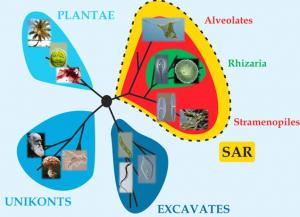Lumpers and Splitters
In every classification scheme, there are two camps. There are those classifiers who tend to find similarities between things and prefer to lump smaller groups into larger groups, and on the other hand those catalogers who tend to find differences and prefer to split larger groups into smaller groups. Sometimes the lumpers prevail, other times the splitters.
And during very rare moments of revolution the mixer-uppers prevail.
At the moment biological taxonomy is undergoing one of those rare mix-up revolutions. The established order of living things — plant, animal, fungi, other — is undergoing an upheaval. Genetic sequencing of species on a large scale is causing taxonomists to reclassify the relationships they had unraveled over the years. This revisioning is especially true of the lower forms of life, where speciation and classification has always been more difficult to discern.
Recently some scientists have re-imagined the basic kingdoms of life after conducting a mass survey of genetic sequences. The number of fundamental kingdoms (supergroups) of life has been in flux for as long as we have declared a kingdom to be a basic group. Once there were 3 kingdoms, then 4, then 5, 6, and at one point as many as 30. Using genetic similarities, some European taxonomists group all life on earth into four kingdoms with some new and novel subgroups.
The four new super-groups of life are Plants (green and red algae, and plants); Opisthokonts (amoebas, fungi, and all animals—including humans); Excavates (free-living organisms and parasites); and SAR (the new main group, an abbreviation of Stramenophiles, Alveolates, and Rhizaria, the names of some of its members.)

According to Science Daily,
The research group has, for example, found that brown algae and silica algae, and groups of single cell organisms like the malaria parasite, marine foraminifera, and the green sun animalcule actually belong to the same group. Previously, these species were thought to be completely unrelated. “The SAR group has to some extent been identified earlier, but we could not know if it was a correct observation because we lacked statistical data. To get that data, we first had to reconstruct the entire eukaryote tree with the help of these 123 genes.”
While genetic sequencing will revise classifications it would not put an end to the revisions. Genetics is still just one more attribute that we use to make sense of life’s fecundity. The categories of kingdom, phylum, class, order, family, genus, and species exist primarily in our minds. Individual organisms may live between the boundaries of two species, or kingdoms. We find it helpful to draw them inside a category cluster in order to talk about and understand them. In the long term, taxonomic classifications will be exposed as statistical clouds. An individual specimen will have probability of inhabiting a particular group based on its genetic makeup and phenotype characteristics. A different specimen will have a different probability.
I venture further to suggest the same thing will happen in our classification of technology. At the moment, a phone is a phone is a phone. But already we see phones and cameras melding in the future. We see computers and TVs converging. We see computers and film falling into each other. We see cars becoming entertainment theaters, and shoes becoming health monitors. As technological devices and services become more complex, their boundaries of identity will blur and overlap.
Eventually, the distinction between living species and technological species will also be primarily one of convenience and habit, as genetically engineered organisms accomplish what machines used to do, and machines do what biological organisms used to do. We’ll end up identifying a device as a probability index. It is mostly phone we say, with a little bit of photosynthesis bacteria. Or this notebook is kinda of alive. It is para-living, in that 50% neighborhood of life.
The splitters will be the last to acknowledge artificial life, or AI. While the lumpers think that both are already here, but lumped into a group we don’t yet have a name for.


